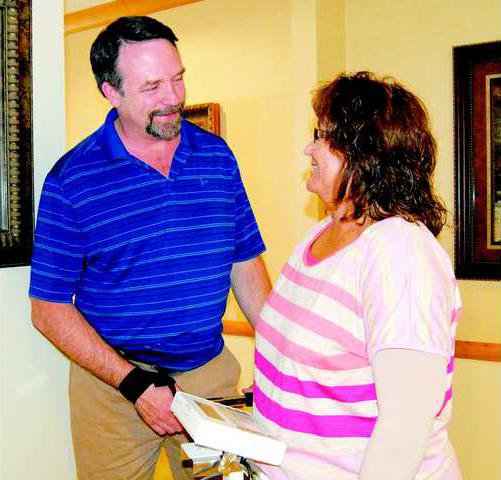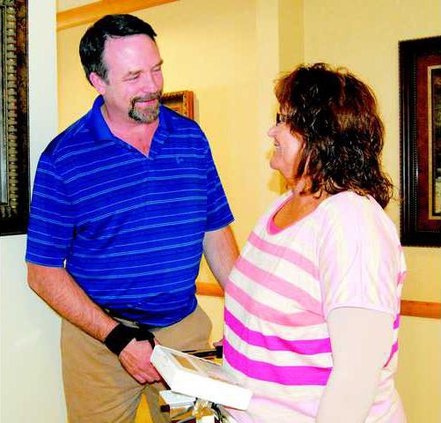Jamie Wolf, Hoisington, gained weight after going through breast cancer treatment and while taking her follow-up medication. She wanted to lose the extra 40-plus pounds but wasn’t sure how to go about it.
Then, lo and behold, a letter arrived.
The letter was from Dr. Claudia Perez-Tamayo, radiation oncologist at Heartland Cancer Center. She and Dr. Mark Fesen, HCC medical oncologist, had learned about a way to encourage Wolf and other breast cancer survivors to lose weight.
And it has worked. Wolf lost 45 pounds during the first six months of participation in the Rural Women Connecting for Better Health study. Her blood pressure also has gone down.
HCC, Midwest Cancer Alliance and many other entities at the University of Kansas are collaborating on the study; KU’s Cancer Center is a National Cancer Institute facility.
Research shows that a healthy weight lowers the risk of breast cancer recurrence but this is the only study in the country that focuses on rural women.
“There are a great number of reasons why obesity is a concern in breast cancer,” Dr. Fesen said. “There is a higher risk for recurrence and other malignancies. In addition, some medications can increase the risk of osteoporosis, which means a higher risk of a bone fracture.
“As oncologists,” Dr. Fesen continued, “we don’t just send patients home with the right pills and their lab-test results. We do all we can to encourage patients, families and the community to lead healthier lifestyles. This study is one step we can take.”
Wolf, 48, underwent treatment at HCC in 2007. It involved chemotherapy, radiation and another round of chemo.
“I was assigned to a group of women from this area for participation in the study,” Wolf said. “We met for tests and to gather background information in January. After that, we participated in a conference call each week for support.
“I am very grateful for this program,” she added. “I have struggled with weight and this group support and accountability have kept me on track.”
Study participants were given a specific diet plan, which consisted of two low-calorie, low-fat frozen entrees, two protein shakes provided by KU and five cups of fruits and vegetables per day.
“We also were given specific guidelines on working our way up to 225 minutes of exercise per week,” Wolf said. “Then we reported what we ate and how much we exercised.
“After six months, it was nice to get together in person again with our group,” Wolf added. “We shared some great stories.”
The Hoisington woman and her peers are beginning the next phase of the study – an 18-month weight-maintenance plan.
Christie Befort, Ph.D., associate professor in KU’s Department of Preventive Medicine and Public Health, is the study’s primary investigator.
“We are really putting the pieces together,” Befort commented. “We are focusing on obesity in rural women and breast cancer prevention, while studying how to lose weight from a distance. KU has many resources including outreach, educational and research programs. You couldn’t do this without this institutional infrastructure.
“Rural women have less access to survivorship services and treatments for obesity,” Befort continued. “Telephone and mail-based interventions are easy and effective ways to provide these services to women. This study will help us learn if these programs are good ways to help breast cancer survivors in rural areas lose weight and maintain weight loss over two years.”
Researchers also will discover if success is associated with changes in risk for breast cancer recurrence by whether it has an effect on blood biomarkers. Success means maintaining a weight loss of 5 to 10 percent of the starting weight or more.
“Our mission is to expand educational opportunities, clinical services and research for rural Kansas,” she added, noting the Midwest Cancer Alliance (MCA) is a crucial part of this.
St. Rose Ambulatory & Surgery Center, which owns HCC, is an MCA member. Drs. Fesen and Perez-Tamayo, along with Dr. Greg Nanney are the local oncologists representing their Salina-based group. It is called Central Care Cancer Center and has many locations throughout Kansas and in Missouri.
Six St. Rose patients are involved in the study.
Heartland Center patients finds success during weight-loss study





